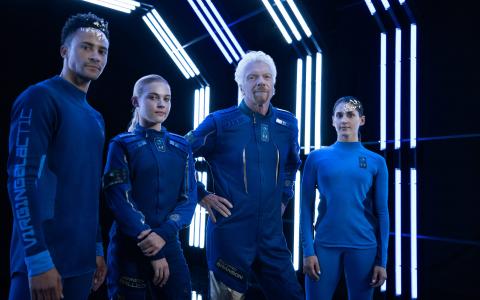
Virgin Galactic is plowing forward in its efforts to begin flying paying passengers into space despite the coronavirus, the company said Tuesday afternoon during its second-quarter earnings conference call.
The company did temporarily suspend operations in March after the COVID-19 outbreak hit the U.S., but it has quickly ramped back up since then, CEO George Whitesides told participants on the call – the company’s second earnings report since going public on the New York Stock Exchange last fall.
Virtually all employees are now back on the job, with no layoffs or furloughs. That includes more than 500 at company headquarters at the Mojave Air and Space Port in Southern California, and 178 people now operating in New Mexico.
Many continue to work from home, but nearly all people who must work onsite have returned, albeit with strict health and safety protocols, including social distancing, use of facial coverings, regular work area disinfection, and employee temperature checks.
“Today, over 90% of our employees who need to be in facilities are (back) onsite,” Whitesides said. “… We’ve retained all of our employees.”
That’s allowed the company to forge ahead with manufacturing operations in Mojave to build two new passenger space ships, while also pursuing the company’s flight-testing program at Spaceport America in southern New Mexico, where Virgin Galactic conducted its first glide flight last Friday for the VSS Unity, the six-passenger rocket that will eventually ferry paying passengers to space.
“That was a major achievement for us,” Whitesides said. “… This is an unprecedented, challenging time, and our No. 1 priority is the health and safety of our employees. But we continue to focus on finishing the test flight program and the launch of commercial service, and last Friday’s glide flight is a key milestone in that.”
Potential customers continue to flock to Virgin Galactic, the company reported. It said 9,160 people had registered their interest in reserving a seat on the Unity as of April 29, up 15% from Virgin Galactic’s last earnings conference call in February, when 8,000 people had expressed interest.
More than 400 people put down $1,000 deposits under Virgin Galactic’s new “One Small Step Initiative” program, which puts them first in line when the company reinitiates ticket sales for future flights.
“We’ve received over 400 deposit payments from individuals in 44 countries,” Whitesides said. “That represents over $100 million in potential future revenue if they were all converted into sales.”
That’s on top of the roughly 600 customers who previously paid about $80 million in deposits to fly on the Unity before Virgin Galactic stopped selling tickets in December 2018. The company hasn’t said yet when sales will reopen.
For now, the company is concentrating on its rocket test flights in New Mexico to review all elements of its suborbital system, whereby a carrier plane called the VMS Eve flies the Unity on its underbelly to about 45,000 feet. At that point, the Unity detaches from the mothership and fires its motors to shoot into space at more than 50 miles up. Passengers can then float freely for a few minutes in microgravity and view the Earth’s curvature before the spaceship floats back down to Earth for a soft landing at the spaceport.
Testing is now limited to glide flights, with the Unity floating back to Earth after detaching from Eve without firing its motors. There will be at least one more glide test before moving to powered flights, Whitesides said.
It’s still unclear when commercial operations will begin. Once flight tests are finished, the company will fly Virgin Galactic founder Sir Richard Branson to space, after which it would launch flights for paying passengers.
The company had previously said it hoped to begin commercial service this year, but it’s unclear whether those plans will be slowed by the coronavirus.
“It’s too early to say what the impact on our business will be,” Whitesides said. “… We need to see how everything goes before we can give projections.”
Investors were clearly hoping for some clarification on the timeline for commercial launch, which some conference participants pressed Whitesides on during the call.
“That’s something that’s always changing and being pushed back,” Rich Smith, a writer for the investor advisory service The Motley Fool, told the Journal on Monday. “I want to know when Branson will go up and when will the company start earning some revenues.”
Virgin Galactic Chief Financial Officer Jon Campagna said revenues weren’t likely to grow much this year, apparently indicating commercial service is unlikely in 2020.
“I anticipate minimal revenue for the rest of the year,” Campagna told conference participants.
The company only generated $238,000 in revenue from engineering services for the first quarter. It reported a $60 million net loss for the period, as it continues to spend on fully establishing its operations before reaching commercial service.
Still, the company has substantial cash on hand to continue moving forward. It reported $419 million in cash and cash equivalents as of March 31.
“We’re in a strong cash position and we have no debt on our balance sheet,” Whitesides said.
Like most companies, Virgin Galactic’s stock has taken a beating in the pandemic, with the price per share dropping from a high of nearly $43 in late February to $16.62 on Tuesday afternoon.



